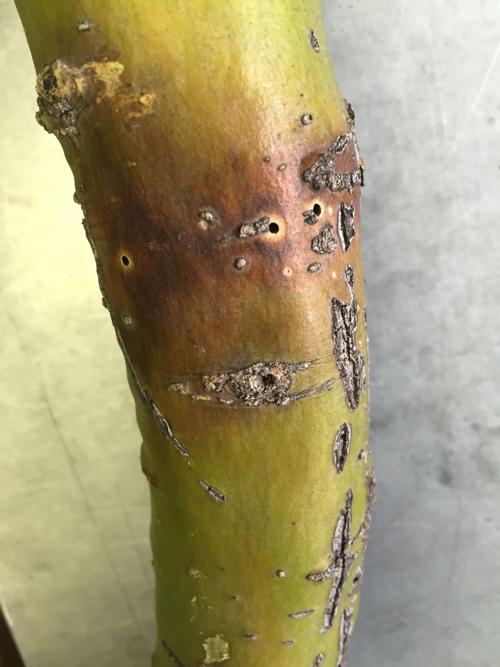Q: The bark of my palo verde tree had yellow-orange blotches on it about six inches in length just about everywhere. I noticed that there is a hole in what looks to be the center of each of these blotches. It looks as though something has either bored into or out of the tree. The bore diameter is around 1/16th of an inch.
1. Is there any chance of salvaging the tree?
2. I have another palo verde around 10 feet from the effected one that shares the same canopy. Is the second palo verde at risk? If so, what can I do to minimize contamination?
3. The trees are in the same wash are the same age and share a microclimate. Are there any reasons why one was affected?
4. Is there anything I can do to ensure that if I do lose the one tree I will not lose any more?
A: The beetles were identified by Gene Hall of the University of Arizona Entomology Department as Trogoxylon prostomoides, a type of wood-boring beetle found in a variety of dead and dying trees. They are not the cause of death, but rather a decomposer species that is attracted to the tree by way of chemical cues the tree gives off as it dies.
There is nothing to do to manage the beetles because they are endemic to the area. However, you can manage the health of nearby trees to make them less susceptible to attack. This mainly includes sufficient watering for desert species such as palo verde trees. Desert trees need a good soak every two to three weeks during the spring, summer, and fall to a depth of 24 to 36 inches.
These beetles have been found in other desert legume species in the plant family Fabaceae such as mesquite. This family includes many native Sonoran Desert trees and they are all known for their drought tolerance but long-term drought conditions can be hard on even the toughest plants.
Peter L. Warren is the urban horticulture agent for the Pima County Cooperative Extension and the University of Arizona. Email: plwarren@cals. arizona.edu





